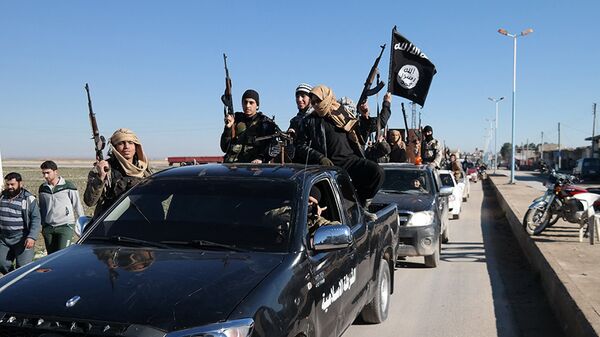US President Donald Trump has once again called on the EU to take back 2,500 captured Daesh (ISIL/ISIS)* fighters, threatening to release the jihadists to Europe if the bloc’s member states reject them.
Earlier, in February, the US president urged Europe to take back about 800 insurgents who had left European states to join Daesh and were subsequently captured in Syria and Iraq by US-allied forces after the defeat of the Islamist caliphate.
"It is certainly not as easy as they think in America", German Foreign Minister Heiko Maas stated in response to Trump's February request, as quoted by AP.
According to the foreign minister, German Daesh militants "can come to Germany only if it is ensured that they can immediately be taken into custody"; however, prior to this, it should be checked "to what extent they were involved in fighting for [Daesh]".
"At this stage France is not responding to [Trump’s] demands", French Minister of Justice Nicole Belloubet told France 2 television, stressing that Paris would repatriate Daesh fighters on a case-by-case basis.
The UK has stripped Britons joining the terrorist organisation of the country's citizenship, thus signalling that it is not inclined to take them back.
While it is believed that about 5,000 European-born militants joined the Islamic State*, EU countries have been hesitant to accept home-grown Daesh terrorists.
Trump's 'Empty Threats' & Substantialised Concerns
Dr Stig Jarle Hansen, associate professor and leader of the international relations programme at the Norwegian University of Life Science and one of the world's leading experts on Islamism, expresses doubts that any European state will act on Donald Trump’s request.
"[The US president's] statement will be seen as infringing on sovereignty, and for many countries it becomes important to show that they stand up for their own sovereignty. If Trump wanted to achieve something like this, silent diplomacy would work better", the Norwegian academic says, adding that, for its part, the White House is not rushing to repatriate terrorist fighters.
However, in early June, two former American Daesh wives and their six children were allowed to return to the US, as the State Department and US-backed Kurdish forces confirmed on 5 July.
According to Hansen, Trump's warning that he would just "release" prisoners to Europe is nothing but an "empty threat".
"Most of the prisoners will be in the custody of Iraq, and various fractions in Iraq, the Western-allied forces in Syria, and the Assad [government], as well as in various refugee camps", he elaborates.
Still, the professor notes that the US president's concerns do have grounds:
· First, many of Daesh militants who still remain in refugee camps, and even in the custody of the factions fighting the terrorist organisation could eventually be released "due to lack of capacity and overview".
· Second, overlooked and released Daesh cadres could give rise to the Islamic State again.
· Third, "the statistics stipulating the risk of returning fighters committing terror has been shown to be quite low (1 in 100), and Western countries have better prison and intelligence capacities than the parties in the Levant", according to the academic.
For his part, Dr David Cook, assistant professor of religious studies at Rice University, suggests that Trump's demand is either "coming from the general pressure that Trump is trying to put on Europe" or from the US-allied Kurds, who are seeking to get rid of the Daesh prisoners "as soon as possible".
Most Daesh detainees are held by the US-backed Syrian Democratic Forces (SDF) in the north-eastern part of Syria. The prospects of a US military withdrawal from the region could thwart the SDF's ability to detain the foreign fighters and their families.
Cook echoes Hansen by suggesting that the US president's threat to "release" the detainees to Europe is just "Trump's bluster".
"So in general, I would place this as part of Trump's overall desire to keep European countries off-balance", he says. "They are on him because of climate change, and the Paris agreement, so he turns the tables on them about the IS [Daesh] prisoners".
As for European countries, "there is virtually no political will from anybody to take their citizens back (other than children): the crimes would be difficult to prosecute, and cost a lot of money", the academic points out, adding that "the numbers of people involved [in terrorist activities] are fairly substantial and would have to be monitored for a long time after they go through the court system, even assuming they are charged and convicted, after their eventual release".
'Legal Limbo': European States are Reluctant to Repatriate Home-Grown Terrorists
According to the European Council on Foreign Relations, a pan-European think tank, Daesh returnees may have found themselves in a "legal limbo", as it would be hard to prove their involvement in terrorist acts in European courts "given the difficulty of conducting investigations in a conflict zone". Additionally, there is still a threat that the former militants would radicalise others in prison.
Thus, the French authorities argue that adult French members of Daesh should be tried on the territory where they committed their crimes. However, having refused to repatriate 12 French Daesh fighters handed over to the Iraqi authorities by the Syrian Democratic Forces (SDF), Paris protested against capital punishment of the detainees in June 2019. Earlier, France repatriated five young children of jihadist fighters in March 2019.
Likewise, Sweden, Belgium, and Norway stretched out their hands to Daesh orphans, while hesitating to embrace adult returnees from the Middle Eastern war zone. According to Hawar News Agency, seven Daesh children were handed to a Swedish delegation in May, while in June, five children from Daesh families were transferred to Norwegian authorities.
The same month, Belgium’s authorities accepted six Belgian children of Daesh members, but refused to repatriate their mothers – two Belgian women convicted of being jihadi militants.
For its part, the UK stripped British Daesh members of their citizenship, including those who fled Britain to the terrorist group while being minors. Shamima Begum, a British-born woman, who joined Daesh at the age of 15 and voiced her intent to return home earlier this year, has remained stateless since February 2019.
Although Denmark previously decided that it would not to recognise "Daesh children" as Danish nationals, a 13-year-old teen whose parents were involved in Daesh terrorist activities was evacuated from the Al-Hol camp in Syria by the Danish authorities in June 2019.
While Berlin signalled in February that German Daesh fighters could be returned to the country, in June 2019, the Bundestag passed a law that would revoke the citizenship of Germans with dual nationality who join foreign terrorist militias.
According to the European Commission, 42,000 foreign fighters from over 120 countries joined Daesh’s ranks between 2011 and 2016, with 5,000 of them allegedly originating from Europe. The report highlights that while the average percentage of militants returning to Europe amounts to around 30 percent, the figure is higher for Denmark, Sweden, and the United Kingdom, adding that nearly 50 percent of fighters from these countries have returned to their homelands.
*Daesh (ISIS/ISIL/Islamic State) is a terrorist organisation banned in Russia.
The views and opinions expressed by the speakers do not necessarily reflect those of Sputnik.





